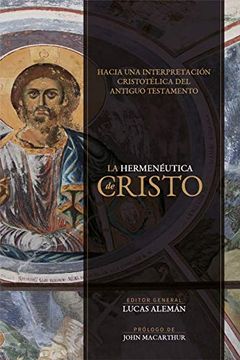Hermenéutica de Cristo: Hacia una Interpretación Cristotélica del Antiguo Testamento
Reseña del libro "Hermenéutica de Cristo: Hacia una Interpretación Cristotélica del Antiguo Testamento"
Colección contemporánea de ensayos teológicos sobre la necesidad de una hermenéutica cristotélica en la predicación contemporánea del Antiguo Testamento. La presencia de Cristo en el Antiguo Testamento es incuestionable. El consenso general es que Cristo puede encontrarse en el Antiguo Testamento y debe predicarse desde el Antiguo Testamento. Sin embargo, no todos están de acuerdo en cómo encontrar y predicar a Cristo con base en la primera parte de la revelación divina. En la actualidad existen por lo menos dos planteamientos hermenéuticos que resumen esta cuestión. Por un lado, está el cristocentrismo que busca encontrar y predicar a Cristo en todos o casi todos los pasajes del Antiguo Testamento y, por el otro lado, está el cristotelismo que entiende que el Antiguo Testamento en su conjunto apunta a Cristo, aunque cada pasaje no trate con él de manera explícita. Ambos planteamientos emplean en su esencia una hermenéutica histórico-gramatical, pero el cristocentrismo añade otros métodos interpretativos que afectan la manera de leer el Antiguo Testamento y pone así en riesgo a la intención misma del autor original. Este libro defiende al cristotelismo como la hermenéutica que anticipa al Cristo que el Nuevo Testamento identifica como Jesús (Mt 26:63-64; Jn 1:41, 45) sin tener que forzarlo en cada pasaje del Antiguo Testamento. Cristo reprendió a los discípulos camino a Emaús al no entender "lo que de él decía" el Antiguo Testamento (Lc 24:27), pues tendrían que haber sido capaces de encontrarlo en la primera parte de la revelación divina de acuerdo a "todo lo que los profetas han dicho" (Lc 24:25). Si Cristo creía que el Antiguo Testamento requería otros métodos interpretativos para encontrar un significado diferente o un sentido más profundo, no habría reaccionado así. Por tanto, la hermenéutica de Cristo es una hermenéutica histórico-gramatical que respeta la intención de los autores del Antiguo Testamento porque sus escritos son revelación divina (2 Tim 3:16; 1 Pe 1:10-12). Para encontrar y predicar a Cristo en y desde el Antiguo Testamento es necesario leerlo cuidadosamente, precisamente de la misma manera que Cristo lo hizo. A contemporary collection of theological essays on the need for a Christotelic hermeneutic in contemporary Old Testament preaching. The presence of Christ in the Old Testament is unquestionable. The general consensus is that Christ can be found in the Old Testament and must be preached from the Old Testament. However, not everyone agrees on how to find and preach Christ based on the first part of the divine revelation. Today there are at least two hermeneutical approaches that summarize this question. On the one hand, there is Christocentrism, which seeks to find and preach Christ in all or almost all the passages of the Old Testament, and on the other hand, there is Christotelism, which understands that the Old Testament, as a whole, points to Christ, although each passage does not deal with him explicitly. Both approaches employ in their essence a historical-grammatical hermeneutic, but Christocentrism adds other interpretative methods that affect the way the Old Testament is read and thus puts at risk the very intention of the original author. This book defends Christotelism as the hermeneutic that anticipates the Christ that the New Testament identifies as Jesus (Mt 26:63-64; Jn 1:41, 45) without having to force him into every passage of the Old Testament. Christ rebuked the disciples on their way to Emmaus for not understanding "what was said of him" in the Old Testament (Lk 24:27), for they should have been able to find him in the first part of the divine revelation according to "all that the prophets have said" (Lk 24:25). If Christ had believed that the Old Testament required other interpretive methods in order to find a different or deeper meaning, He would not have reacted in this way. Therefore, Christ's hermeneutics is a historical-grammatical hermeneutics that respects the intent of the Old Testament authors because their writings are divine revelation (2 Tim. 3:16; 1 Pet. 1:10-12). To find and preach Christ in and from the Old Testament, it is necessary to read it carefully, precisely in the same way that Christ did.

